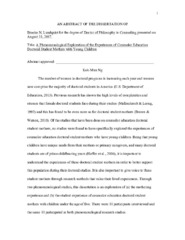A Phenomenological Exploration of the Experiences of Counselor Education Doctoral Student Mothers with Young Children
Abstract
The number of women in doctoral programs is increasing each year and women now comprise the majority of doctoral students in America (U.S. Department of Education, 2015). Previous research has shown the high levels of complexities and stresses that female doctoral students face during their studies (Mallinckrodt & Leong, 1992) and this has found to be even more so for doctoral student mothers (Brown & Watson, 2010). Of the studies that have been done on counselor education doctoral student mothers, no studies were found to have specifically explored the experiences of counselor education doctoral student mothers who have young children. Being that young children have unique needs from their mothers or primary caregivers, and many doctoral students are of prime childbearing years (Hoffer et al., 2006), it is important to understand the experiences of these doctoral student mothers in order to better support this population during their doctoral studies. It is also important to give voice to these student mothers through research methods that value their lived experiences. Through two phenomenological studies, this dissertation is an exploration of (a) the mothering experience and (b) the student experience of counselor education doctoral student mothers with children under the age of five. There were 11 participants interviewed and the same 11 participated in both phenomenological research studies. The first study is an exploration of the mothering experience of counselor education doctoral student mothers with a child or children under the age of five. The results of Study 1 identified six major common themes that described the experience of the 11 women who participated in the research study. These themes included: (a) ambivalence, where the priority of the mothering role meets that of the strong desire to be a successful doctoral student and professional in the counselor education field; (b) increasing and accepting give and take: negotiating expectations while increasing coping mechanisms; (c) the teeter-totter of mothering-student roles; (d) “Superwoman syndrome”; (e) indistinguishable roles (those of mother and student) combine together to create identity; and (f) the importance of leading by example. The second study is an exploration of the student experience of counselor education doctoral student mothers with a child or children under five years of age. The findings from Study 2 resulted in five common themes that existed for the participants, including (a) experiencing ambivalence about being a doctoral student while mothering a young child/children; (b) experiencing constant pressures due to responsibilities that can be conflicting, complimentary, or both; (c) responding by increasing coping mechanisms to accommodate the doctoral student role; (d) believing in the importance of leading by example; and (e) acknowledging and accepting that they have a different experience than their doctoral student peers. Despite findings in Study 1 and Study 2 that were similar or overlapped, there were differences found between the experiences of the participants in their different roles. These results provided insights into the experiences that counselor education doctoral student mothers with children under the age of five have during their doctoral programs. It is hoped that this information will help doctoral program administrators, faculty, student peers, and even doctoral student mothers gain a better understanding of the unique experiences that these students face. It is important that doctoral program faculty and administration not only better understand this population of students, but also realize the importance of engaging with these students as “whole people” (Springer et al., 2009, p. 453) which includes who they are outside of their student roles. University departmental systems and programs should be evaluated, enhanced, or put into place for these students to help support them during their doctoral studies. This could include family-friendly policies, child care options, parental support groups, and further educating faculty and staff about the unique experiences that these students face while in their doctoral programs (Lester, 2013).
Description
A dissertation submitted to Oregon State University in partial fulfillment of the requirements for the degree of Doctor of Philosophy.
Original item type
PDF
Original extent
xii, 195 pages
Copyright
This original work is protected by copyright. Copyright is retained by the author(s). Works may be viewed, downloaded, or printed, but not reproduced or distributed without author(s) permission.


 Maintained by the Northwest University Library
Maintained by the Northwest University Library